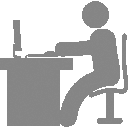 MY ELEVATOR STORY
MY ELEVATOR STORY
I'm part Sherlock Holmes, part Mary Poppins. As a software detective, I love investigating application issues and solving problems. Like Poppins, I am very organized; and I believe that there's always room for improvement. With these traits and skills and over ten years of experience in the software industry, I am able to establish and improve testing processes, design and develop applications to make testing faster and more efficient, and verify that software is stable and exceeds customers' expectations.
I have a passionate curiosity for learning technologies, and I'm open to opportunities that can help develop my professional skills. My goal is to enhance my testing skills to faciliate in developing well-designed, user-friendly, stable, efficient, and maintainable applications. Ultimately, I want to gain expertise in software testing and inspire women to consider a career in STEM.
 WHAT EXACTLY DO I DO?
WHAT EXACTLY DO I DO?
I ASK QUESTIONS
Being inquisitive, I believe, is one of the important qualities that good testers have. It doesn't matter if they're testing software, hardware, or a coffee mug. Good testers need to ask questions and be motivated to learn about what they're testing. They're not satisfied with just knowing what a product does, and how it works; they also want to understand why we need the product, who it's designed for, how it's going to be used, when it's supposed to work, when it's not supposed to work, etc. etc.
I MAKE PLANS
When testing software, I don't just dive in and start testing right away. I always devise a plan of attack first (so to speak). I work with the team to create a testing strategy that would define the project's scope and limitations and the types of tests that will be implemented. What do I need to test? What don't I need to test? What is the best way to test this project? Should I test this manually? Can testing be automated? Are there existing tools that can make testing easier? Can I develop a tool or utility to help me test this? By reviewing the options beforehand, we are able to identify the level at which tests should be created so that we can have robust tests and we can get faster feedback on future issues.
I WORK WITH OTHERS
Testing is not an isolated phase in the software development life cycle. As a tester, I need to continuously collaborate with project managers, developers and other testers throughout the sprint. By establishing clear communication channels with members of the project team earlier in the process, I can facilitate sessions for identifying missing requirements, setting scope and limitations, and performing regression analysis.
I VERIFY SOFTWARE RELEASES
As a tester, I am involved during the design phase to check that the stories have enough details so that developers can start implementing them. I review pull requests to check that the unit and component tests created by developers are covering the needed scenarios. I develop unit, integration, contract, and E2E tests to help verify that the software is stable and that it meets the client's requirements and expectations. I create testing applications such as data generators, data integrity checkers, records viewers, and stubs for vendor applications to make testing easier. And I work with the product owners in classifying issues into those that need to be fixed in the current release from the ones that can be pushed to future releases.
I PROVIDE DOCUMENTATION
Writing skills are crucial for software testers to effectively communicate project details and testing. I write test plans to make sure that testing procedures are repeatable. I write test reports to show what was covered during testing. I document software defects and feature requests to guide developers when they're making software changes. I write release notes to assist clients in identifying the functionalities and changes implemented in new releases. And I write user guides to assist clients and the project team in using the software.

 MY ELEVATOR STORY
MY ELEVATOR STORY



 WHAT EXACTLY DO I DO?
WHAT EXACTLY DO I DO?